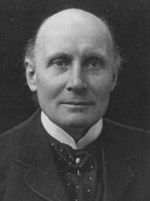阿弗烈·諾夫·懷海德
出自 MBA智库百科(https://wiki.mbalib.com/)
阿弗烈·諾夫·懷海德(Alfred North Whitehead)又譯為:阿爾弗雷德·諾思·懷特黑德——“過程哲學”的創始人。目錄 |
阿弗烈·諾夫·懷海德(Alfred North Whitehead,1861年2月15日-1947年12月30日)英國數學家、哲學家和教育理論家。他出生於英國的肯特郡,在美國麻薩諸塞州劍橋逝世。1885-1911年任教於劍橋大學,1924-1937年任教於哈佛大學。他與伯特蘭·羅素(Bertrand Russell)合著的《數學原理》標志著人類邏輯思維的巨大進步,是永久性的偉大學術著作之一。同時也創立了20世紀最龐大的形而上學體系。“過程哲學”的創始人。
他於1861年2月15日出生於英國東南部的拉姆斯蓋特。他的祖父是當地一位有名望的教育家,曾任當地一所私立學校的校長。他的父親先後從事教育、宗教工作,十分關心教育事業。受家庭的影響,懷特海對教育也很感興趣。
懷特海童年時期是在家鄉接受教育的。1875年,他來到多塞特郡的謝伯恩學校就學。主要學習拉丁語、希臘語、數學和歷史。1880年,他考入劍橋大學三一學院,主攻數學。課餘,他經常閱讀和討論文學、哲學、政治、宗教等著作。1885年,懷特海大學畢業,留在母校任數學和力學教師。1887年和1905 年,他分別獲得碩士和博士學位。他在母校任教25年,主要從事教學、著述和一些政治活動。
1910年,懷特海遷居倫敦。1911—914年,他在倫敦大學擔任許多職務。 1914—924年,在肯欣頓皇家科技學院擔任應用數學教授。這段時期,他受柏格森、愛因斯但思想的影響,把興趣轉向科學哲學問題的研究。 1924?937年,他應聘到美國哈佛大學擔任哲學教授。退休後,擔任哈佛大學名譽教授,居住在坎布里奇市。1947年12月30日,懷特海去世,終年 86歲。
懷海德的過程哲學可以說是起因於牛頓物理學的崩解;這是他所親自見證的,使他大為震撼。他的形而上學見解出現於他的《自然之概念》(The Concept of Nature, 1920年)。而在他的《科學與現代世界》(Science and the Modern World, 1925年)的論文中他的形而上學就已架構完成了;這本書也是對思想史,對科學和數學在西方文明興盛過程中的角色之重要研究。懷海德的形而上學受到柏格森變的哲學之影響,但他也是一個柏拉圖主義者,認為“諸事件(events)之特征源於超時間單體(entities)對之契入(ingression)”。
1927年,懷海德受邀在愛丁堡大學的季福講座演說。1929年講稿出版為《歷程與實在》(Process and Reality)一書,為歷程哲學奠基,是對西方學的重大貢獻。除了英國外,歷程哲學在世界各處都引人跟隨,較著名的有哈特雄(Charles Hartshorne),還有歷程神學家約翰‧科布(John Cobb, Jr.)。
《歷程與實在》一書因其護衛有神論而著名,不過懷海德的上帝和亞伯拉罕的啟示性上帝是根本不同的。懷海德的機體哲學(philosophy of organism)帶起了歷程神學,在這方面有貢獻的除了哈特雄及科布外,還有格裡芬(David Ray Griffin)。有些基督徒和猶太人認為歷程神學對認識上帝和宇宙是很有效果的進路。就如整個宇宙是一直在流轉改變,做為宇宙起源的上帝也被視為是在成長與改變的。
1933年出版的《觀念之歷險》(The Adventure of Ideas)對懷海德形而上學的主要見解作了摘要,是他最後也最可讀的一本著作。此書中也對美、真理、藝術、冒險與和平作了定義。他認為“沒有全部的真理;所有真理都是一半的真理。想把他們當作全部的真理就是在扮演魔鬼。”
Mathematician, philosopher, and metaphysician Alfred North Whitehead is chiefly remembered for his three volume Principia Mathematica (co-authored with Bertrand Russell), and for his development of process philosophy Process philosophy essentially states that: "Mathematical physics presumes in the first place an electromagnetic field of activity pervading space and time. The laws which condition this field are nothing else than the conditions observed by the general activity of the flux of the world, as it individualises itself in the events." Thus "nature is a structure of evolving processes. The reality is the process." Or to put it another way: process, rather than substance, should be taken as the fundamental metaphysical constituent of the world.
Born in Ramsgate, England in 1861, the youngest of four children, Alfred Whitehead was homeschooled by his father (an Anglican minister) until he was 14 years old. In 1875 he left home to attend Sherbourne Independent School where he showed a talent for mathematics. And in 1880 he entered Trinity College, Cambridge in 1880 on a mathematics scholarship. Five years later he was a teacher at Trinity College and five years later still Bertrand Russell arrived as a student. Russell, who later asserted that "Whitehead was extraordinarily perfect as a teacher" adopted Whitehead as his mentor. Although the two had each already churned out their own separate and significant work (Whitehead was elected a Fellow of the Royal Society in 1903 as for his work on universal algebra), they were together drawn by their overlapping areas of interest and research to jointly produce the groundbreaking work on the foundations of mathematics the now famous Principia Mathematica.
In 1910 the two published the first volume of the Principia. Whitehead moved to University College London, where he served as Dean of the Faculty of Science and held several other senior administrative posts. And in 1914 he and Russell completed their work on the final volume of Principia (the nearly decade long project was originally to have taken only a year to complete), Whitehead was appointed Professor of Applied Mathematics at the Imperial College of Science and Technology, and for reasons not wholly clear, the two began to go drift in different directions.
Then, in 1924, Whitehead was appointed Professor of Philosophy at Harvard University and moved to the U.S. It was here that he began work on the metaphysical ideas that would give rise to process philosophy -- first expressed in Science and the Modern World (1925). Finally, in Process and Reality (1929, in which he presented an alternative to Einstein's views), he presented a more fully articulated philosophy, one that proclaimed that process, rather than substance, was the fundamental metaphysical constituent of the world.
Whitehead taught at Harvard until his retirement in 1937 and died in 1947. In the course of his lifetime Whitehead published roughly two dozen books including those mentioned above as well as The Principle of Relativity (1922), and The Function of Reason (1929). Honors accorded him include his election to the Royal Society in 1903, the James Scott Prize in 1922, the Royal Society's Sylvester Medal (1925), election as Fellow of the British Academy in 1931, and the Order of Merit, awarded him in 1945. His process philosophy was later developed into process theology by Charles Hartshorne et al. Whitehead was married once, to Evelyn Wade in 1891. They had three children, two sons and a daughter
As an interesting side note, although raised an Anglican, Whitehead considered for a time (in the 1880s) converting to the Roman Catholic religion. But ultimately he became an agnostic in response to new developments in science and his growing certainty that Newtonian physics was incorrect.
- Treatise on Universal Algebra (1898)
- Mathematical Concepts of the Material World (1905)
- An Introduction to Mathematics (1911)
- Principia Mathematica (1913, with Bertrand Russell)
- Enquiry Concerning the Principles of Natural Knowledge (1919)
- Concept of Nature (1920)
- Science and the Modern World (1925)
- Religion in the Making (1926)
- Process and Reality (1929)









可能有誤。懷海德的過程哲學(又稱為過程哲學)